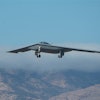Britain will lose thousands of troops, build new aircraft carriers without new fighter jets and delay a multibillion-pound upgrade to its nuclear deterrent under sweeping defense cuts being announced Tuesday following the first major military review in more than a decade.
Ahead of a speech to Parliament, Prime Minister David Cameron told troops in London that Britain will remain a major global power, despite fears among allies that the austerity plans could diminish the country's military might.
Cameron is scheduled to outline the details of cuts likely to total as much as 3 billion pounds ($4.8 billion) from the defense ministry's annual budget of about 37 billion pounds ($59 billion).
In the most eye-catching move, Britain is expected to press ahead with a 5 billion pound ($8 billion) program to build two flagship new aircraft carriers — but won't equip them with British fighter jets for about a decade.
It means the vast vessels will either sail without aircraft, or carry French and U.S. jets — a decision the main opposition Labour Party described as eccentric.
"We will be an absolutely front-rank military power," Cameron promised, speaking at the Permanent Joint Headquarters, in London. "We will make sure that Britain is well-defended and we have a set of armed forces that actually are fit for the modern world."
Military cutbacks come a day before Treasury chief George Osborne's long-anticipated announcement of a government-wide program to drastically cut department budgets and welfare bills.
The largest cuts to public spending since World War II are aimed at virtually eliminating Britain's deficit, which stands at over 10 percent of gross domestic product.
While Cameron pledges to safeguard funding for British forces in Afghanistan, the U.S. has already raised worries that cuts could leave its ally unable to take on a major role in military missions in the future.
"This is not a time where you can slacken in the need to keep strong and to invest in your military," said Jim Townsend, the U.S. deputy assistant secretary of defense for Europe and NATO.
In a phone call with President Barack Obama late on Monday, Cameron promised that Britain would continue to be "a robust ally of the United States," despite the budget constraints.
Obama told his British counterpart he hoped the changes would allow the U.K. to "retain the full spectrum of military capabilities that permits our forces to partner effectively together around the world."
Ian Kearns, an analyst at London's Royal United Services Institute military think tank, said Britain may find itself unable to fight alongside U.S. forces in the future if it can't invest in the same sophisticated technology. "If one ally uses better technology than its allies, interoperability becomes quite different," Kearns said.
Cameron was expected to confirm that more than 7,000 army troops, and personnel from the air force and navy will be cut from Britain's ranks of about 175,000. He is likely to confirm the aging aircraft carrier HMS Ark Royal and a fleet of Harrier jets will be immediately taken out of service.
An order for 138 F-35 Joint Strike Fighter jets, which are mainly being built by Lockheed Martin in Fort Worth, Texas, is also likely to be slashed.
Relics of the Cold War — including tanks and heavy artillery — will be sacrificed as Britain looks to focus on threats from al-Qaida related terrorism and bolster its cyber defenses. Britain is likely to offer increased funding to its special forces, and will announce a 500 million pounds ($795 million) package for efforts against cyber terrorism.
Defense Secretary Liam Fox said the U.K. needed a military which was "flexible enough to adapt to the new threats, rather than locked into the post-Cold War projects that we had in the past."
Cameron has vowed to replace Britain's fleet of four Trident nuclear missile-carrying submarines, but is expected to confirm that the 20 billion pound ($30 billion) program will be delayed. It would mean the submarines would only come into service from 2027, and that the costs would be paid after Britain's debts are cleared.
Decisions on the cuts were taken by Britain's national security council, a committee of ministers, military commanders and intelligence chiefs set up by Cameron after he took office in May.
Cameron's office said the country's next defense review will take place in 2015, after the country's next national election.
______
Associated Press Writers Anne Gearan in Washington, and Ben Timmins in London contributed to this report


















